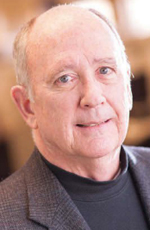As winter drags on into another month, the church season of Lent at this time appropriately ushers in a period of self-examination, often through prayer, penance, fasting and the like.
These ancient practices have seen additions over the years, with some faithful moving from pious acts of self-denial to those more overtly “giving” in nature, such as additional volunteer activity during the period that stretches from Ash Wednesday on Feb. 18 to Easter on April 5.

Let me suggest two other possibilities or additions. First, be sure to read “Contemplate spiritual practices for Lent” (page 12). Joann Nesser, founder and retired director of the Christos Center for Spiritual Formation in Lino Lakes, Minn., offers practical steps to incorporate the acts of solitude, silence and prayer of early Christians into our modern lives. She says Western Christians are searching for meaning and by looking to the past “are finding a deep spiritual life that heals inner wounds from life’s hurts and loneliness from modern life’s isolation.”
Also drawing on this time of self-examination, Presiding Bishop Elizabeth A. Eaton worked with a task force to develop a resource that asks congregations to “reflect on the nature and purpose of the church, especially in relation to our global and ecumenical commitments to other church bodies. [A] review has prompted this group to ask you — leaders, members and friends of ELCA congregations — what you think about this question: How do we make a difference by being the church together?”
The resource, “Claimed, Gathered, Sent: A Guide for Conversation,” is now available at www.elca.org/faith. According to the leader guide, there are five handouts, each outlining a process for conversation among various groups within congregations. The first four handouts focus on the emphases Eaton identified for the ELCA shortly after her election: we are church, we are Lutheran, we are church together, we are church for the sake of the world.
The fifth portion looks at the ELCA’s relationship with its global and ecumenical partners, particularly the Lutheran World Federation.
The goal is “to invite reflection, conversation and discernment about what being the church means today” and “to strengthen the mission and ministry of congregations and the ELCA as a whole by going back to our spiritual roots.”
Eaton and the sponsoring Ecclesiology of a Global Church Task Force hope participants will identify issues and questions for further consideration. Congregations are asked to note their insights, stories and future plans after completion of the process and send them to faith@elca.org. We should never stop contemplating how we might best serve. This is an opportunity for every congregation to engage in constructive work that can have an impact on the life of the entire ELCA for years to come.




